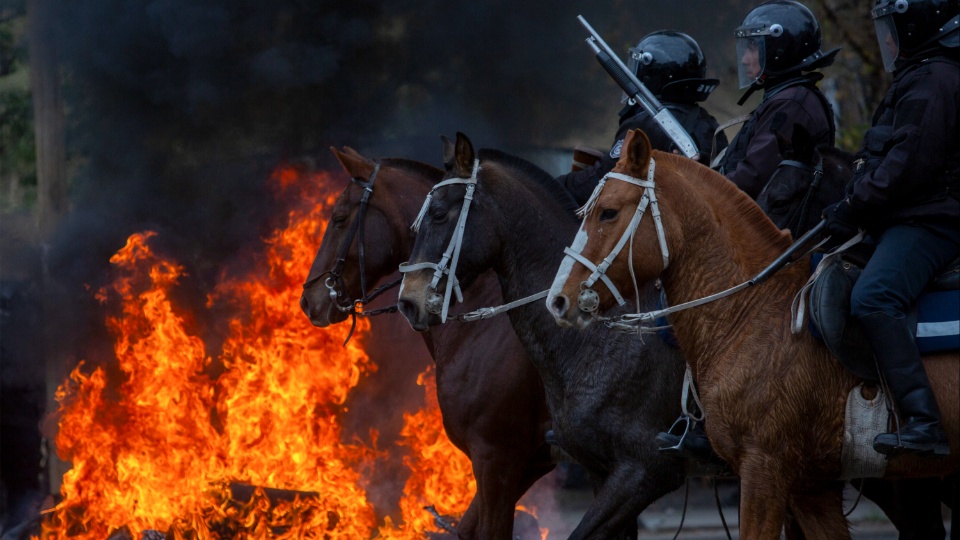
In Jujuy province, in Argentina’s extreme Northeast, poor people’s discontent, the provincial government’s overreach, and popular resistance have combined to in a crisis that portends grief and struggle ahead.
Setting the stage: free rein for local reactionaries to do as they wish, the oppression of Indigenous peoples, foreign plundering of natural resources, and a U.S. eye over the whole affair.
June was a month of turmoil. Governor Gerardo Morales proposed reforming the province’s constitution. Teachers’ unions, meanwhile, agitated for higher salaries.
The 50-day discussion period that should have preceded the Constitutional Convention never happened. The convention, presided over by Morales himself, played out over three weeks. He timed the election of delegates to coincide with provincial government elections and thereby assure enough voter turnout to elect delegates who backed the constitutional reform he wanted.
Morales’s proposed changes included new provisions for criminalizing public protests and fresh restrictions on “freedom of expression, petition, and association.” He also pushed for revised legal mechanisms for regulating access to land, so as to deliver land to lithium-producing multinational corporations. Indigenous peoples would face the probability that untitled plots of land crucial to their survival, for generations, would no longer be available. Jujuy province is the center of lithium extraction in Argentina, the world’s fourth-largest producer of the precious metal.

Elected in 2015, Morales cut back governmental support for education, and teachers lost their jobs. Educators’ salaries in Jujuy are the lowest in Argentina. Teachers’ unions in nearby Salta province, meanwhile, recently carried out strikes and won pay increases.
On June 5, a Jujuy teachers’ union struck for better pay. On June 9, several teachers’ unions and the municipal employee union marched on Jujuy City, population 375,000. Morales decreed “increased penalties against individuals and organizations participating in any protests or social mobilization.”
On June 14, Indigenous people marched on the city “to demonstrate their rejection of the [constitutional] reforms…being devised behind closed doors.” City streets were teeming with protesters the next day when word came that agreement was near on constitutional reforms. Soon, Indigenous groups and others were erecting roadblocks on highways throughout the province. Police, assisted by unidentifiable enforcers using unmarked vehicles, stepped up arrests. Calls went out for Morales’s resignation.
The Constitutional Convention on June 20 approved alterations of 66 of the provincial constitution’s 212 articles. Street pressure resulted in two reforms involving Indigenous rights and access to land being withdrawn, temporarily. Restrictions on protesting and free expression, however, remained. The constitution now provides for an “automatic majority in the legislature for the governing party” and no longer requires that provincial elections be held every two years.
Massed demonstrators responded by assaulting the Government House with projectiles. Police turned them back using tear gas, rubber bullets, and arrests.
The provincial government’s repressive methods elicited criticism from elsewhere in Argentina and from the Inter-American Commission on Human Rights, Amnesty International, and the United Nations High Commissioner for Human Rights.
Morales has exceeded all the political boundaries that once governed provincial governors’ behavior. Early in his first term, for example, he enlarged the top provincial court from five to nine judges. That way, future policy measures would surely gain judicial approval. By 2018, 25 of his family members were serving as provincial government officeholders.
One presumes that the governor’s evident lack of restraint is bad news farther afield. He leads Argentina’s right-wing Radical Civic Union party and now is a vice-presidential candidate on one of two tickets aiming to represent the right-wing Unite for Change electoral coalition in upcoming national elections.
It’s clear: Morales will stop at nothing in his drive to dismantle democracy and any checks on his power. His government in 2016 arrested Milagro Sala, leader of the Tupac Amaru Organization that at the time was assisting Indigenous families as they looked for food, housing, basic education, and more. The government was interfering and the Organization resisted. The police arrested Sala on flimsy pretexts and, seven years later, she is still detained.
Continuing his efforts to waylay Ondigenous independence, Gerardo Morales took part in the November 2019 coup that deposed Bolivian President Evo Morales. That Morales was an Indigenous president of a multi-national republic. Governor Morales was instrumental in arranging for U.S. assistance in the overthrow.
Around Sept.4, 2019, Gerardo Morales supposedly joined a meeting in Jujuy held to organize the coup against Evo Morales. Present was Luis Camacho who, based in Santa Cruz in Bolivia, was leading the coup in progress. Later on, Governor Morales himself traveled to Santa Cruz to confer with plotters.
On that same day, Ivanka Trump and State Department, CIA, and USAID personnel arrived in Jujuy ostensibly to support local women’s initiatives. Trump had brought $400 million with her. A Hercules C-130 aircraft was deployed on the runway close to the recently-arrived U.S. plane. Almost at once, that plane departed for Santa Cruz. Camacho was on board.
There is speculation he may have been conveying the U.S. funds that would be used to bribe the senior Bolivian Army officers who pressured Evo Morales to resign. Later on, Gerardo Morales surely was not blind to that same airplane carrying weapons to plotters in Santa Cruz.
The governor’s zeal in serving U.S. interests shows up again now as he cultivates ties with U.S. officials for the sake of attracting U.S. investment in the extraction and processing of lithium. He met with U.S. Ambassador Marc Stanley in May 2022, and later Stanley was in Jujuy as Morales acquainted him with “a portfolio of projects in development.” Stanley and his family attended an Indigenous festival.

Together with governors of other lithium-producing provinces, Morales in 2022 visited European countries and the United States. There, he met with Washington officials, bankers, and industrial leaders, among them Elon Musk, owner of Tesla Corporation.
Morales’s friendship with Argentinian government economic minister Sergio Massa is surprising—President Alberto Fernandez’s government is on the other side of the political divide—but understandable: Massa is a favorite in U.S. official circles, a lead promotor of foreign investment in Argentina’s natural resources, and a likely presidential candidate in elections later this year.
The story here centers on Morales’s doings as an individual. But people respond to circumstances collectively and engage collectively in social change. Morales is representative, it seems, of that class of well-paid intermediaries who have long arranged for the transfer of wealth from wherever to a waiting set of plunderers.
The history of the Americas has them freeing up land so as to get at the wealth that is there. They must dispose of the set of people living on the land, however, so military force is made available. Morales thus becomes an updated conquistador.
Writing for the Argentinian Club of Journalist Friends of Cuba (capac-web.org), Alberto Mas provides specifics. In a report entitled “Jujuy is the North American Laboratory for Argentina,” he states:
“The visit of General Laura Richardson of the U.S. Southern Command [on April 17, 2023] did not in the least hide intentions of controlling the production and exportation of Argentina’s lithium. This is part of a strategic plan for the region which they have implemented over the course of time: The coup against Evo Morales in Bolivia had the smell of lithium.”
We hope you appreciated this article. At People’s World, we believe news and information should be free and accessible to all, but we need your help. Our journalism is free of corporate influence and paywalls because we are totally reader-supported. Only you, our readers and supporters, make this possible. If you enjoy reading People’s World and the stories we bring you, please support our work by donating or becoming a monthly sustainer today. Thank you!












Comments